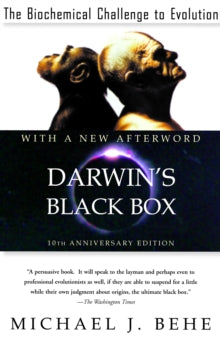by Michael J. Behe
Ten years ago, Darwin's Black Box launched the Intelligent Design movement: the argument that nature exhibits evidence of design, beyond Darwinian randomness. Today the movement is stronger than ever, and the book is a classic and an international bestseller. At last, Michael Behe has updated the book with a major new afterword on the state of the debate.
The Intelligent Design movement was born when a handful of scientists realized that nature exhibits characteristics that could not have evolved by random mutation. Prominent among them was Michael Behe, a microbiologist working in a field that Darwin could not even have imagined existing. Microbiology has discovered staggering complexity at the cellular level of life and during his research Behe made a stunning discovery: Some parts of life are irreducibly complex.
They cannot function without all of their parts. Yet step-by-step genetic mutations would never produce all of those parts together at once. Some parts of the biological world must have been designed.
From one end of the spectrum to the other, DARWIN'S BLACK BOX has established itself as the key text in the intelligent design movement, the one argument that must be addressed in order to determine whether Darwinian evolution is sufficient to explain life as we know it, or not.

